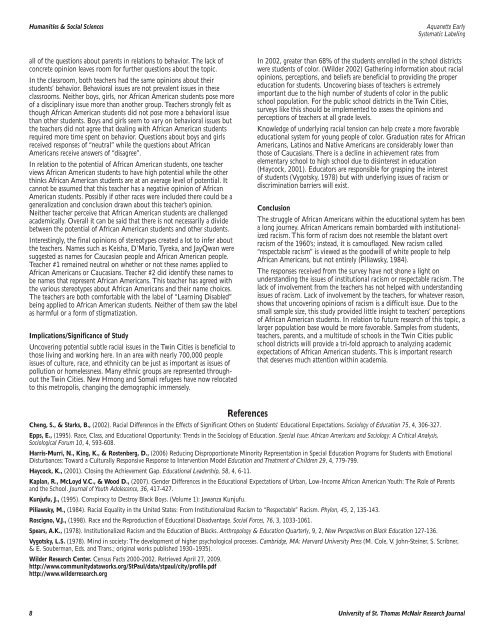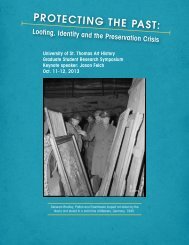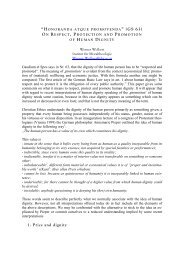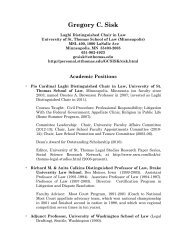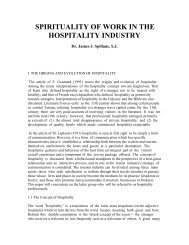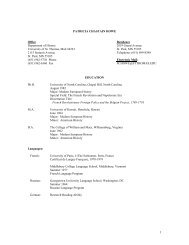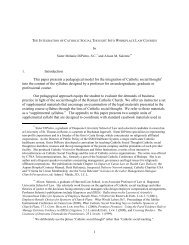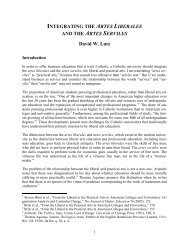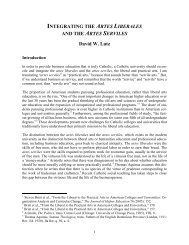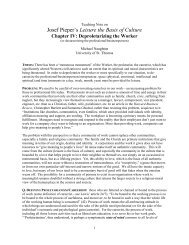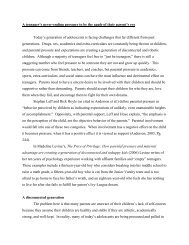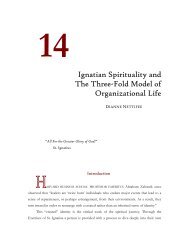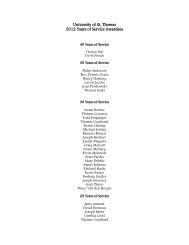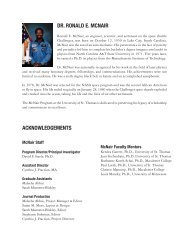McNair Research Journal - University of St. Thomas
McNair Research Journal - University of St. Thomas
McNair Research Journal - University of St. Thomas
Create successful ePaper yourself
Turn your PDF publications into a flip-book with our unique Google optimized e-Paper software.
Humanities & Social Sciences<br />
all <strong>of</strong> the questions about parents in relations to behavior. The lack <strong>of</strong><br />
concrete opinion leaves room for further questions about the topic.<br />
In the classroom, both teachers had the same opinions about their<br />
students’ behavior. Behavioral issues are not prevalent issues in these<br />
classrooms. Neither boys, girls, nor African American students pose more<br />
<strong>of</strong> a disciplinary issue more than another group. Teachers strongly felt as<br />
though African American students did not pose more a behavioral issue<br />
than other students. Boys and girls seem to vary on behavioral issues but<br />
the teachers did not agree that dealing with African American students<br />
required more time spent on behavior. Questions about boys and girls<br />
received responses <strong>of</strong> “neutral” while the questions about African<br />
Americans receive answers <strong>of</strong> “disagree”.<br />
In relation to the potential <strong>of</strong> African American students, one teacher<br />
views African American students to have high potential while the other<br />
thinks African American students are at an average level <strong>of</strong> potential. It<br />
cannot be assumed that this teacher has a negative opinion <strong>of</strong> African<br />
American students. Possibly if other races were included there could be a<br />
generalization and conclusion drawn about this teacher’s opinion.<br />
Neither teacher perceive that African American students are challenged<br />
academically. Overall it can be said that there is not necessarily a divide<br />
between the potential <strong>of</strong> African American students and other students.<br />
Interestingly, the final opinions <strong>of</strong> stereotypes created a lot to infer about<br />
the teachers. Names such as Keisha, D’Mario, Tyreka, and JayQwan were<br />
suggested as names for Caucasian people and African American people.<br />
Teacher #1 remained neutral on whether or not these names applied to<br />
African Americans or Caucasians. Teacher #2 did identify these names to<br />
be names that represent African Americans. This teacher has agreed with<br />
the various stereotypes about African Americans and their name choices.<br />
The teachers are both comfortable with the label <strong>of</strong> “Learning Disabled”<br />
being applied to African American students. Neither <strong>of</strong> them saw the label<br />
as harmful or a form <strong>of</strong> stigmatization.<br />
Implications/Significance <strong>of</strong> <strong>St</strong>udy<br />
Uncovering potential subtle racial issues in the Twin Cities is beneficial to<br />
those living and working here. In an area with nearly 700,000 people<br />
issues <strong>of</strong> culture, race, and ethnicity can be just as important as issues <strong>of</strong><br />
pollution or homelessness. Many ethnic groups are represented throughout<br />
the Twin Cities. New Hmong and Somali refugees have now relocated<br />
to this metropolis, changing the demographic immensely.<br />
References<br />
Aquanette Early<br />
Systematic Labeling<br />
In 2002, greater than 68% <strong>of</strong> the students enrolled in the school districts<br />
were students <strong>of</strong> color. (Wilder 2002) Gathering information about racial<br />
opinions, perceptions, and beliefs are beneficial to providing the proper<br />
education for students. Uncovering biases <strong>of</strong> teachers is extremely<br />
important due to the high number <strong>of</strong> students <strong>of</strong> color in the public<br />
school population. For the public school districts in the Twin Cities,<br />
surveys like this should be implemented to assess the opinions and<br />
perceptions <strong>of</strong> teachers at all grade levels.<br />
Knowledge <strong>of</strong> underlying racial tension can help create a more favorable<br />
educational system for young people <strong>of</strong> color. Graduation rates for African<br />
Americans, Latinos and Native Americans are considerably lower than<br />
those <strong>of</strong> Caucasians. There is a decline in achievement rates from<br />
elementary school to high school due to disinterest in education<br />
(Haycock, 2001). Educators are responsible for grasping the interest<br />
<strong>of</strong> students (Vygotsky, 1978) but with underlying issues <strong>of</strong> racism or<br />
discrimination barriers will exist.<br />
Conclusion<br />
The struggle <strong>of</strong> African Americans within the educational system has been<br />
a long journey. African Americans remain bombarded with institutionalized<br />
racism. This form <strong>of</strong> racism does not resemble the blatant overt<br />
racism <strong>of</strong> the 1960’s; instead, it is camouflaged. New racism called<br />
“respectable racism” is viewed as the goodwill <strong>of</strong> white people to help<br />
African Americans, but not entirely (Piliawsky, 1984).<br />
The responses received from the survey have not shone a light on<br />
understanding the issues <strong>of</strong> institutional racism or respectable racism. The<br />
lack <strong>of</strong> involvement from the teachers has not helped with understanding<br />
issues <strong>of</strong> racism. Lack <strong>of</strong> involvement by the teachers, for whatever reason,<br />
shows that uncovering opinions <strong>of</strong> racism is a difficult issue. Due to the<br />
small sample size, this study provided little insight to teachers’ perceptions<br />
<strong>of</strong> African American students. In relation to future research <strong>of</strong> this topic, a<br />
larger population base would be more favorable. Samples from students,<br />
teachers, parents, and a multitude <strong>of</strong> schools in the Twin Cities public<br />
school districts will provide a tri-fold approach to analyzing academic<br />
expectations <strong>of</strong> African American students. This is important research<br />
that deserves much attention within academia.<br />
Cheng, S., & <strong>St</strong>arks, B., (2002). Racial Differences in the Effects <strong>of</strong> Significant Others on <strong>St</strong>udents’ Educational Expectations. Sociology <strong>of</strong> Education 75, 4, 306-327.<br />
Epps, E., (1995). Race, Class, and Educational Opportunity: Trends in the Sociology <strong>of</strong> Education. Special Issue: African Americans and Sociology: A Critical Analysis,<br />
Sociological Forum 10, 4, 593-608.<br />
Harris-Murri, N., King, K., & Rostenberg, D., (2006) Reducing Disproportionate Minority Representation in Special Education Programs for <strong>St</strong>udents with Emotional<br />
Disturbances: Toward a Culturally Responsive Response to Intervention Model Education and Treatment <strong>of</strong> Children 29, 4, 779-799.<br />
Haycock, K., (2001). Closing the Achievement Gap. Educational Leadership, 58, 4, 6-11.<br />
Kaplan, R., McLoyd V.C., & Wood D., (2007). Gender Differences in the Educational Expectations <strong>of</strong> Urban, Low-Income African American Youth: The Role <strong>of</strong> Parents<br />
and the School. <strong>Journal</strong> <strong>of</strong> Youth Adolescence, 36, 417-427.<br />
Kunjufu, J., (1995). Conspiracy to Destroy Black Boys. (Volume 1): Jawanza Kunjufu.<br />
Piliawsky, M., (1984). Racial Equality in the United <strong>St</strong>ates: From Institutionalized Racism to “Respectable” Racism. Phylon, 45, 2, 135-143.<br />
Roscigno, V.J., (1998). Race and the Reproduction <strong>of</strong> Educational Disadvantage. Social Forces, 76, 3, 1033-1061.<br />
Spears, A.K., (1978). Institutionalized Racism and the Education <strong>of</strong> Blacks. Anthropology & Education Quarterly, 9, 2, New Perspectives on Black Education 127-136.<br />
Vygotsky, L.S. (1978). Mind in society: The development <strong>of</strong> higher psychological processes. Cambridge, MA: Harvard <strong>University</strong> Press (M. Cole, V. John-<strong>St</strong>einer, S. Scribner,<br />
& E. Souberman, Eds. and Trans.; original works published 1930–1935).<br />
Wilder <strong>Research</strong> Center. Census Facts 2000-2002. Retrieved April 27, 2009.<br />
http://www.communitydataworks.org/<strong>St</strong>Paul/data/stpaul/city/pr<strong>of</strong>ile.pdf<br />
http://www.wilderresearch.org<br />
8 <strong>University</strong> <strong>of</strong> <strong>St</strong>. <strong>Thomas</strong> <strong>McNair</strong> <strong>Research</strong> <strong>Journal</strong>


